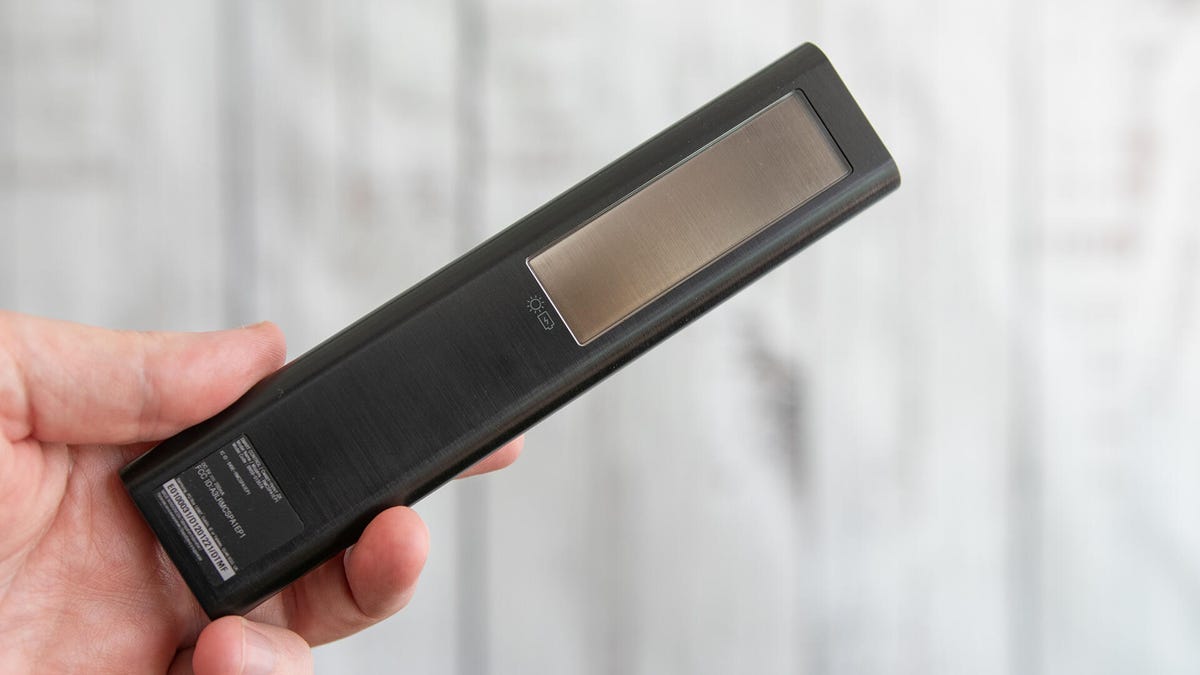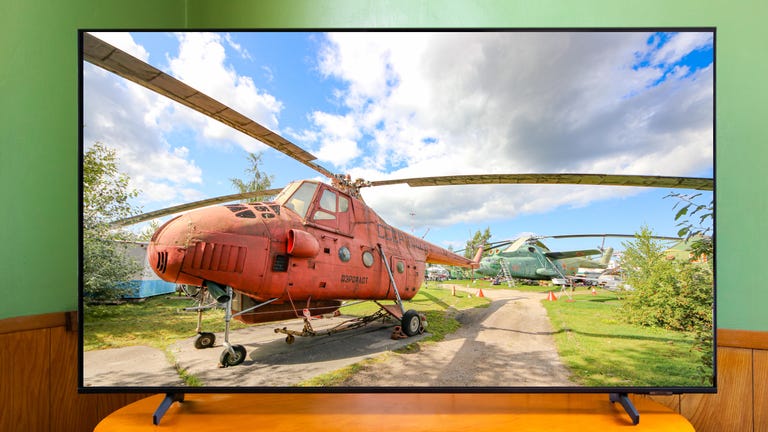 Why You Can Trust CNET
Why You Can Trust CNET Samsung Q60A series (2021) review: QLED TV brings out HDR brightness, color
The least expensive QLED is a solid choice for Samsung fans, but other TVs are better values for the money.
The Samsung Q60A is its entry-level QLED model, aka an LCD TV with quantum dots. Those magical dots let the Q60A perform better than many traditional LCDs that cost less, with far greater brightness and deeper, richer colors with HDR content. Its skinny design also separates it from its bulkier brethren.
Like
- Sleek design and excellent remote
- Brighter than cheaper TVs
- Great color with HDR
Don't like
- Expensive for what you get
- Weak speakers
While the extra color and brightness is great, you definitely pay for it compared to entry-level models from other brands. The Q60A is roughly twice as expensive as the similar size TCL 4-Series and Vizio V-Series I compared it to, but overall image quality isn't twice as good. While brighter than those TVs, it still doesn't have the brightness nor dynamic range to really take advantage of HDR content. Its speakers are worse as well, so if you care about decent audio it requires investing in a soundbar.
Meanwhile the Q60A costs about the same as the TCL 6-series, CNET's favorite TV for the money. I didn't compare the Q60A directly to the 6-Series for this review, but based on my observations of the Q60A and CNET's review of the 6-Series, the TCL has a better picture.
The Q60A is a good choice if you want a Samsung and appreciate its design and feature upgrades (like a solar-powered remote) over cheaper models. It definitely offers better performance than a typical "budget" TV, but it's a worse value than non-Samsung brands.
Samsung's Q60A series comes in a massive array of sizes, from 43 inches all the way up to 85 inches. I reviewed the 55-inch model.
Solar remote alert!
We need to talk about the new Samsung remote. It's excellent overall and has one great feature: It's solar powered. On the back is a tiny array of solar panels. Those, combined with some efficient electronics, mean that it's always going to have enough power. No more changing batteries, which in a small way is good for the environment, too.

My theater room has next to no natural light, and rarely has the lights on, and after several weeks the remote still has plenty of charge. I'm not sure all remotes will go this solar route in the future, but it'd be cool if they did. Alternately, you can charge the remote via USB-C on the bottom.
Turn it over and you'll find a sparse selection of tastefully designed keys and a mic for voice search. This lets you speak a show or movie name and then shows you where you can stream or buy it. This screen even has a Metacritic score to further impress (or shame) you about your selection. Oddly, it highlights Apple TV Plus as the main service to do this from, but an additional click brings up the other options. It's not quite as user-friendly as Vizio's version, or Roku's if you have one of their products with a voice remote. It does get the job done though.
You can also use Samsung's SmartThings app to control the TV, along with other smart devices in your home.
Features and connections
Aside from quantum dots and that remote, Q60A is fairly typical for an entry-level(ish) TV. It lacks stuff like a 120Hz refresh rate, next-gen gaming perks and local dimming found on step-up Samsungs like the QN90A.
It does share that TV's smart features, however. As far as apps go, you get all the standard options like Netflix, Vudu, HBO Max and so on. The Q60A's interface isn't nearly as in-your-face about streaming as, say, the Vizio and to a lesser extent, the Roku-enabled TCL. The apps are grouped in a small row at the bottom of the screen, more like smart TVs of yore. There's also Samsung TV Plus, which is essentially like free basic cable, though you can't fast-forward through the ads.
Connections are fairly standard. There are three HDMI inputs, one of which has eARC, and there are two USB ports, one of which should provide enough power for a streaming stick, if you decide to eschew the TV's own apps. Wired LAN gets you connected if your Wi-Fi isn't up to snuff. There are no analog inputs, so if you've got a Wii or, I don't know, a LaserDisc player or something, you'll need an inexpensive HDMI converter.
- HDMI inputs: 3 (1 eARC)
- Analog inputs: None
- USB port: 2 (1.0A and 0.5A power)
- Internet: Wi-Fi, LAN
- Antenna input
- Optical digital audio output
- Analog audio output: No
- Speakers: 2 downward-facing, 20W total
An Energy Star rating of $14 per year for the 55-inch is on the more efficient end of similar TVs, and the other sizes in the line are similarly efficient.
Picture quality comparisons
The Samsung Q60A is far more expensive than either of the TVs I compared it to, namely the Vizio V-Series and the TCL 4-Series. However, as Samsung's most entry-level QLED model, it provides a good indication of what image quality improvements you get from quantum dots. I connected all three via a Monoprice 1x4 distribution amplifier, and viewed all of them side-by-side-by-side.
Right out of the gate my eye was drawn to the Samsung. It is bright. Well, at least compared to the other two TVs, which are already pretty bright. When going all-out with HDR content, it's about twice as bright as the Vizio. If you have a really bright room, or like to watch TV in the middle of the day in a room with many windows, the Samsung will be easier to see than cheaper TVs.
Aside from brightness, color with HDR sources was the other really noticeable difference between the three TVs. The quantum dots let the Q60A produce far deeper, richer colors than the Vizio and TCL, which use traditional color filters on their LCD elements. So you get far more vibrant purples, bluer blues, more crimson-y reds than the others could hope to produce.
The contrast ratio , and therefore the dynamic range, isn't much different, however. So overall the image doesn't take advantage of HDR content like some other TVs would, in particular those equipped with local dimming. That said, thanks to brightness and color it takes more advantage of HDR than the other two TVs, so that's a step in the right direction.
Subjectively speaking, I'd say the added colors and brightness make the Samsung look roughly 50% better with HDR than the TCL and Vizio, which isn't bad but definitely less than the 100% more it typically costs. Again, that if you're watching HDR content. Any non-HDR content, which is most TV shows and older movies, the difference is even closer.
No TV sounds good. All have tiny speakers. However, the Samsung is especially bad in this regard. Even at maximum volume it's not particularly loud and has lots of distortion when you're cranking it up. In my theater the volume was regularly above 90 (out of 100) and even maxed, it was hard to hear with the air conditioner on. This is not an issue the Vizio nor the TCL had. This is the price paid for such a thin design. So despite its cost, if you're considering this TV you should budget in a soundbar to go with it. In fairness, that's always true -- just, er, more true here.
High end of the low end
The Q60A is an interesting TV. It's Samsung's low-end QLED, but it's far more expensive than other entry-level TVs. It's like if Porsche tried to make a car to compete with budget sedans like the Hyundai Accent or Nissan Versa ... but it cost $50,000. So yes, the Q60A does perform better than other low-end TVs, but it also costs significantly more. And it simply is not, for example, twice as good as the TCL 4-Series.
That said, it is better. It's also far more attractive, with its svelte design. So if you're able to spend a bit more on a TV and want brighter, better HDR performance in addition to sleeker design, the Q60A is a great option. Just make sure you budget for a soundbar, too.


